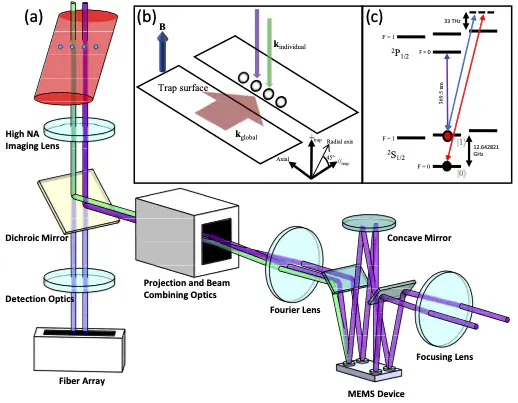High-Fidelity Two-Qubit Gates Using a Microelectromechanical-System-Based Beam Steering System for Individual Qubit Addressing
Ye Wang, Stephen Crain, Chao Fang, Bichen Zhang, Shilin Huang, Qiyao (Catherine) Liang, Pak Hong Leung, Kenneth R. Brown, Jungsang Kim
October, 2020
Abstract
In a large scale trapped atomic ion quantum computer, high-fidelity two-qubit gates need to be extended over all qubits with individual control. We realize and characterize high-fidelity two-qubit gates in a system with up to four ions using radial modes. The ions are individually addressed by two tightly focused beams steered using microelectromechanical system mirrors. We deduce a gate fidelity of 99.49(7)% in a two-ion chain and 99.30(6)% in a four-ion chain by applying a sequence of up to 21 two-qubit gates and measuring the final state fidelity. We characterize the residual errors and discuss methods to further improve the gate fidelity towards values that are compatible with fault-tolerant quantum computation.
Publication
Physical Review Letter 125, 150505

PhD student at MIT EECS
I’m a third-year PhD student in the Electrical Engineering and Computer Science department at MIT. My primary interest is in the intersection of physics, AI, and neuroscience. I’m advised by Ila Fiete from the MIT Brain and Cognitive Science department. Some of my recent interests are understanding the mechanisms of compositional generalization in generative models, how structural and/or functional modularity emerge within artificial and biological systems, and beyond. I’m interested in a broad range of topics regarding studying the principles of artificial/biological intelligence and consciousness as emergent phenomena, via quantitative tools from physics as well as empirical studies. I completed my undergraduate studies at Duke University in physics and math, where I worked on controlling and denoising quantum computers.
 MEMS
MEMS